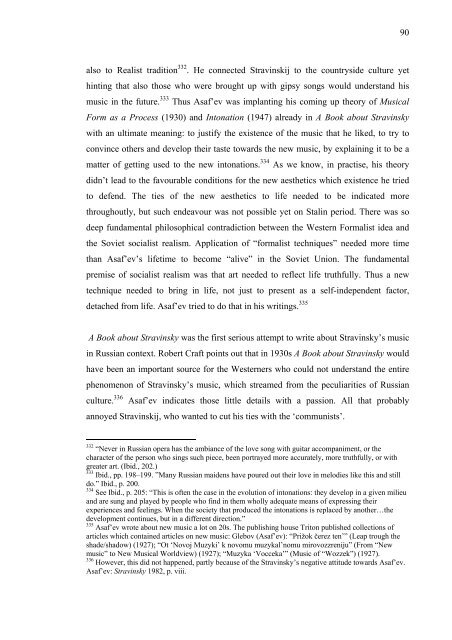Boris Asaf'ev and the Soviet Musicology - E-thesis
Boris Asaf'ev and the Soviet Musicology - E-thesis
Boris Asaf'ev and the Soviet Musicology - E-thesis
You also want an ePaper? Increase the reach of your titles
YUMPU automatically turns print PDFs into web optimized ePapers that Google loves.
also to Realist tradition 332 . He connected Stravinskij to <strong>the</strong> countryside culture yet<br />
hinting that also those who were brought up with gipsy songs would underst<strong>and</strong> his<br />
music in <strong>the</strong> future. 333 Thus Asaf’ev was implanting his coming up <strong>the</strong>ory of Musical<br />
Form as a Process (1930) <strong>and</strong> Intonation (1947) already in A Book about Stravinsky<br />
with an ultimate meaning: to justify <strong>the</strong> existence of <strong>the</strong> music that he liked, to try to<br />
convince o<strong>the</strong>rs <strong>and</strong> develop <strong>the</strong>ir taste towards <strong>the</strong> new music, by explaining it to be a<br />
matter of getting used to <strong>the</strong> new intonations. 334 As we know, in practise, his <strong>the</strong>ory<br />
didn’t lead to <strong>the</strong> favourable conditions for <strong>the</strong> new aes<strong>the</strong>tics which existence he tried<br />
to defend. The ties of <strong>the</strong> new aes<strong>the</strong>tics to life needed to be indicated more<br />
throughoutly, but such endeavour was not possible yet on Stalin period. There was so<br />
deep fundamental philosophical contradiction between <strong>the</strong> Western Formalist idea <strong>and</strong><br />
<strong>the</strong> <strong>Soviet</strong> socialist realism. Application of “formalist techniques” needed more time<br />
than Asaf’ev’s lifetime to become “alive” in <strong>the</strong> <strong>Soviet</strong> Union. The fundamental<br />
premise of socialist realism was that art needed to reflect life truthfully. Thus a new<br />
technique needed to bring in life, not just to present as a self-independent factor,<br />
detached from life. Asaf’ev tried to do that in his writings. 335<br />
A Book about Stravinsky was <strong>the</strong> first serious attempt to write about Stravinsky’s music<br />
in Russian context. Robert Craft points out that in 1930s A Book about Stravinsky would<br />
have been an important source for <strong>the</strong> Westerners who could not underst<strong>and</strong> <strong>the</strong> entire<br />
phenomenon of Stravinsky’s music, which streamed from <strong>the</strong> peculiarities of Russian<br />
culture. 336 Asaf’ev indicates those little details with a passion. All that probably<br />
annoyed Stravinskij, who wanted to cut his ties with <strong>the</strong> ‘communists’.<br />
332<br />
“Never in Russian opera has <strong>the</strong> ambiance of <strong>the</strong> love song with guitar accompaniment, or <strong>the</strong><br />
character of <strong>the</strong> person who sings such piece, been portrayed more accurately, more truthfully, or with<br />
greater art. (Ibid., 202.)<br />
333<br />
Ibid., pp. 198–199. ”Many Russian maidens have poured out <strong>the</strong>ir love in melodies like this <strong>and</strong> still<br />
do.” Ibid., p. 200.<br />
334<br />
See Ibid., p. 205: “This is often <strong>the</strong> case in <strong>the</strong> evolution of intonations: <strong>the</strong>y develop in a given milieu<br />
<strong>and</strong> are sung <strong>and</strong> played by people who find in <strong>the</strong>m wholly adequate means of expressing <strong>the</strong>ir<br />
experiences <strong>and</strong> feelings. When <strong>the</strong> society that produced <strong>the</strong> intonations is replaced by ano<strong>the</strong>r…<strong>the</strong><br />
development continues, but in a different direction.”<br />
335<br />
Asaf’ev wrote about new music a lot on 20s. The publishing house Triton published collections of<br />
articles which contained articles on new music: Glebov (Asaf’ev): “Prižok čerez ten’” (Leap trough <strong>the</strong><br />
shade/shadow) (1927); “Ot ‘Novoj Muzyki’ k novomu muzykal’nomu mirovozzreniju” (From “New<br />
music” to New Musical Worldview) (1927); “Muzyka ‘Vocceka’” (Music of “Wozzek”) (1927).<br />
336<br />
However, this did not happened, partly because of <strong>the</strong> Stravinsky’s negative attitude towards Asaf’ev.<br />
Asaf’ev: Stravinsky 1982, p. viii.<br />
90

















